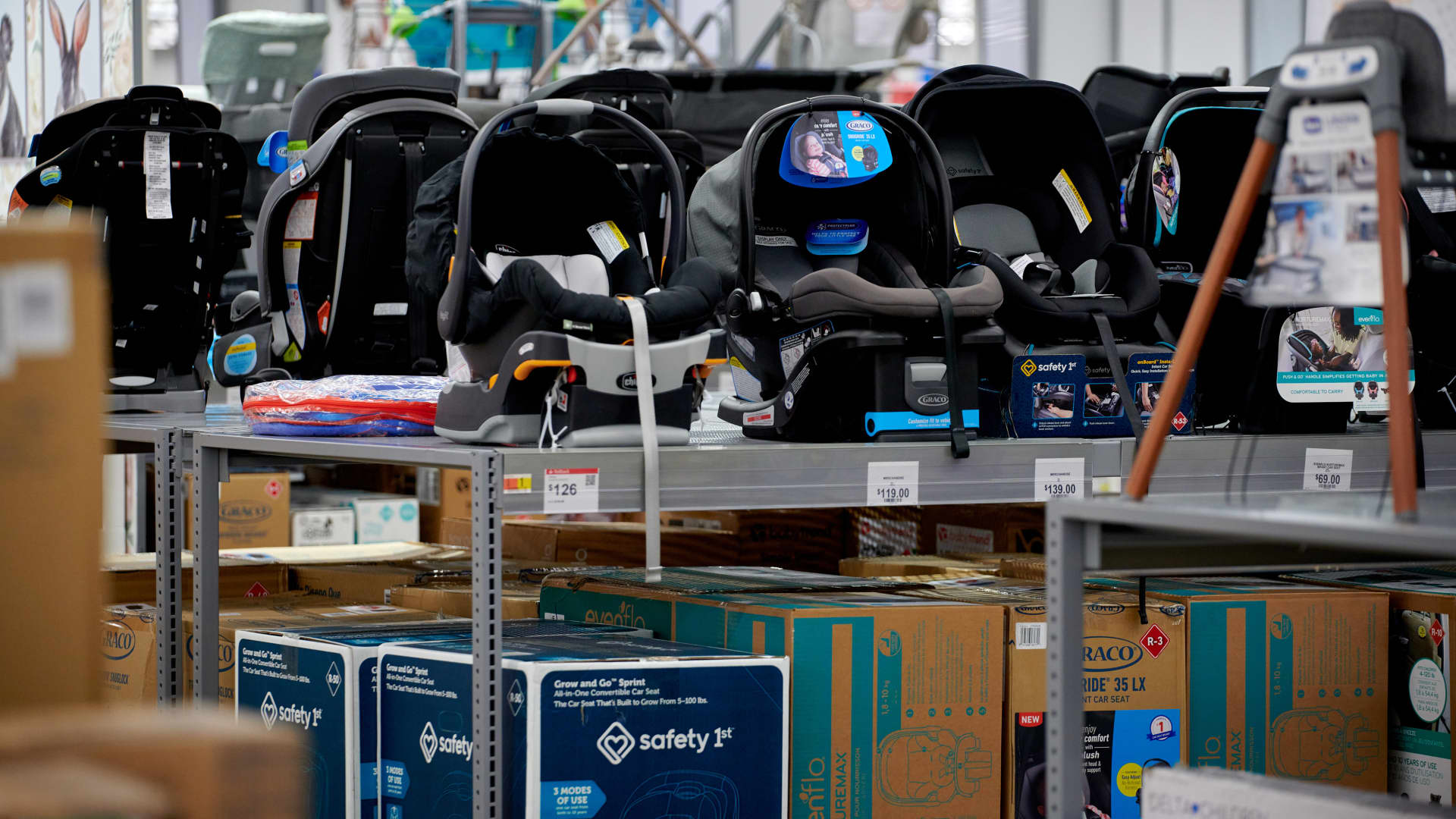Global Trends and Politics
Mortgage Rates Top 7% Amid Bond Market Turmoil

The average 30-year fixed mortgage rate jumped to 7.1% on Friday, marking the highest level since mid-February, according to Mortgage News Daily. The sharp increase—13 basis points in just one day—reflects a volatile week in the bond market driven by policy uncertainty and global economic tensions.
What’s Driving the Spike in Rates?
Mortgage rates tend to move in tandem with the 10-year Treasury yield, which experienced a turbulent week. Midweek, yields surged following the implementation of new tariffs on dozens of countries by former President Donald Trump. Though many tariffs were later reduced, the aggressive 145% duty on Chinese imports remained in place, continuing to rattle the markets. Despite a lower-than-expected inflation report, bond yields rose again on Friday, pushing mortgage rates higher.
Expert Perspective
“There have been some bad weeks for bonds over the years, but unless your career began before 1981, this was the worst you’ve seen in terms of the jump in 10-year yields,” said Matthew Graham, Chief Operating Officer at Mortgage News Daily.
Graham notes that this moment could be seen in two ways: “Either it’s the end of the worst week for 10-year yields since 1981, or it’s the close of a fairly average two-week stretch in line with the broader trend of the past 18 months.”
Inflation Expectations & Consumer Sentiment
Adding to the uncertainty, a new consumer sentiment report released Friday showed a steep decline in confidence. Inflation expectations jumped from 5% in March to 6.7% in April—the highest since 1981. This spike in inflation sentiment is especially concerning during the crucial spring housing market season, when many families consider home purchases.
Impact on the Housing Market
With mortgage rates climbing and inflation expectations rising, economists are sounding the alarm about the potential ripple effects on housing.
“Forget about housing in this environment,” said Nancy Lazar, Chief Global Economist at Piper Sandler. “With rates back up and consumers increasingly concerned about job security, housing will remain on the weak side.”
Higher borrowing costs reduce affordability, pushing many potential buyers to the sidelines just as the busiest season for real estate gets underway.
Final Thoughts
The convergence of surging mortgage rates, economic uncertainty, and inflation concerns is casting a shadow over the spring housing market. For potential buyers, the cost of borrowing is significantly higher than just a few weeks ago. For sellers, fewer qualified buyers may lead to slower sales and more price adjustments.
Staying informed and assessing your financial readiness will be key in navigating these shifting conditions.
Global Trends and Politics
Baby items get pricier, congressional report says

Introduction to Tariff Policies and Baby Gear
The cost of some baby gear has risen in recent weeks due to President Donald Trump’s tariff policies, according to a new congressional report. The report analyzed the prices of five common items bought for babies and found that they have increased by 24%, or by $98 combined, between April 1 and June 9.
Impact of Tariff Policies on Baby Gear
The analysis tracked the prices of five popular baby gear categories: car seats, bassinets, strollers, high chairs, and baby monitors. It used data from baby registry website Babylist to determine the price increases. The findings show that new parents are facing higher prices for essential items, which can be a significant burden on their budgets.
Companies’ Responses to Tariff Policies
Some companies have said they will work to mitigate the impact of the levies and offset the costs to consumers, while others, including Best Buy and Costco, have said they already raised some prices. Walmart and Target said they plan to hike prices on some items. Baby gear sold in the U.S. is specifically at risk of tariff impact because 97% of strollers and 87% of car seats are manufactured in China, according to Babylist.
Price Increases for Specific Baby Gear
The committee’s report tracked the prices of the most popular Amazon listings for products from five of Babylist’s categories of baby goods. The Amazon bestsellers included items from brands Graco, AirClub, Summer by Ingenuity, Evenflo, and HelloBaby. The report measured the price increases over time using the price-checking websites Keepa.com and Camelcamelcamel.com. Of the five items studied, the Graco car seat saw the highest price increase, with a 44.8% increase over the measured time period.
Response from Graco Owner Newell Brands
A spokesperson for Graco owner Newell Brands told CNBC in a statement that the report appears to have started collecting data on the Graco car seat during a period when retailers were running a promotion. The spokesperson said the car seat was on sale on April 1, so the price was hiked by about $20, not by $43, as suggested in the report. Executives from Newell said during an April 30 earnings call that the company had raised prices on its baby gear by about 20%.
Broader Impact of Tariff Policies on Baby Gear
A broader Babylist analysis of 11 categories, including products like bouncers and diaper bags, found that costs increased by an average of $400 combined between March 10 and June 3. Those higher prices for new parent households in the U.S. amount to $875.2 million in total additional costs, according to the analysis and based on data from the American Community Survey. The study found particular risk for parents in California, with parents in that state collectively facing a potential $100.3 million in additional baby costs this year.
Conclusion
The tariff policies implemented by President Donald Trump have resulted in significant price increases for baby gear, making it more difficult for new parents to afford essential items. The report’s findings highlight the need for policymakers to consider the impact of tariff policies on consumers, particularly those with limited budgets. As the trade tensions between the U.S. and China continue to escalate, it is likely that the prices of baby gear will continue to rise, affecting many families across the country.
FAQs
Q: What is the main reason for the price increase in baby gear?
A: The main reason for the price increase in baby gear is the tariff policies implemented by President Donald Trump.
Q: Which baby gear categories have been most affected by the tariff policies?
A: The baby gear categories most affected by the tariff policies are car seats, bassinets, strollers, high chairs, and baby monitors.
Q: How much have the prices of baby gear increased since April 1?
A: The prices of baby gear have increased by 24%, or by $98 combined, since April 1.
Q: Which state is most affected by the price increase in baby gear?
A: California is the state most affected by the price increase in baby gear, with parents facing a potential $100.3 million in additional baby costs this year.
Q: What is the total additional cost of baby gear for new parent households in the U.S.?
A: The total additional cost of baby gear for new parent households in the U.S. is $875.2 million.
Global Trends and Politics
Amex Platinum, Chase Sapphire Get 2025 Refresh

Introduction to the Premium Credit Card Rivalry
The long-running rivalry between the country’s top premium credit cards is about to heat up again. JPMorgan Chase announced last week that a refresh of its Sapphire Reserve — the travel and dining rewards card that went viral when it arrived in 2016 — was imminent.
Response from American Express
In response, American Express on Monday said that "major" changes were coming to its consumer and business Platinum cards later this year. While short on details, the New York-based card company said that its update would be its largest ever investment in a card refresh. "We are going to double down on the things we know based on the data that our card members love," said Amex President of U.S. Consumer Services Howard Grosfield in an interview. "But more importantly, we’ll bring a whole bunch of new and exciting benefits and value that will far, far, far exceed the annual fee."
History of Premium Credit Cards
American Express pioneered the premium credit card space decades ago with cards that bundled perks at airlines and hotels with access to its own network of high-end airport lounges. But JPMorgan shook up the industry in 2016, igniting stiff competition among card issuers with a lavish sign-on bonus and other incentives for its Sapphire card.
Expected Changes and Updates
The expectation among industry experts is that both companies will offer ever-longer lists of perks in travel, dining and experiences, while potentially raising their annual fees, as has been the pattern with recent updates. The Platinum card has a $695 annual fee, while the Sapphire has a $550 fee. On Reddit and other forums, card users circulated rumors that JPMorgan was hiking the annual fee on its Sapphire product to $795. A JPMorgan spokesperson declined to comment.
Launch of the New Platinum Card
The new Platinum card will launch in the fall, Grosfield said. The updates from both companies are expected to further intensify the competition in the premium credit card market.
Conclusion
The rivalry between JPMorgan Chase and American Express is set to heat up with the upcoming refresh of their premium credit cards. With expected updates and new benefits, card users can look forward to enhanced perks and services. However, the potential increase in annual fees may be a concern for some users.
FAQs
Q: What changes can we expect from the refresh of the Sapphire Reserve and Platinum cards?
A: The changes are expected to include new benefits and perks in travel, dining, and experiences, as well as potential increases in annual fees.
Q: When will the new Platinum card launch?
A: The new Platinum card will launch in the fall.
Q: How much is the annual fee for the Platinum card?
A: The annual fee for the Platinum card is $695.
Q: How much is the annual fee for the Sapphire card?
A: The annual fee for the Sapphire card is $550.
Q: Are there rumors of a price increase for the Sapphire card?
A: Yes, there are rumors that JPMorgan may hike the annual fee on its Sapphire product to $795, but a JPMorgan spokesperson declined to comment.
Global Trends and Politics
Battle Over Jimmy Buffett Estate

A court battle over the late singer Jimmy Buffett’s $275 million estate has highlighted the growing litigation over the trillions of dollars in wealth being passed down to spouses and families, experts said. Jimmy Buffett’s widow, Jane Buffett, filed a petition last week in a Los Angeles court to remove her co-trustee, Richard Mozenter, from the marital trust created to support her after the singer’s death in 2023.
Background of the Dispute
Jane Buffett, who married Jimmy in 1977, alleged that Mozenter has been “openly hostile and adversarial” toward her and has refused to give her details on the trust and its financials. She alleged Mozenter is collecting “excessive fees” of $1.7 million a year and that he’s mismanaging the trust assets, projecting income of only $2 million, implying annual returns of less than 1%. Mozenter has filed his own lawsuit in Palm Beach County, Florida, alleging that Jane has been “completely uncooperative” in his efforts to manage the trust.
Jimmy Buffett’s Estate Plan
Jimmy Buffett planned carefully for the afterlife. His will, first written more than 30 years ago and amended in 2017 and again in 2023, directed that most of his assets be placed in a marital trust for Jane. The trust was created “for the wife’s sole benefit of her lifetime,” according to legal filings. The three children they shared — Savannah, Delaney, and Cameron — are the so-called remainder beneficiaries of the marital trust, which means they will receive any remaining assets left after Jane’s death.
Assets in the Estate
The assets Buffett left were substantial. A successful businessman and entrepreneur, Buffett built a brand empire and merchandising business that far surpassed his song rights and touring. According to the filings, the assets in the estate included $34.5 million of real property; $15 million of equity in a company called Strange Bird Inc., which held Buffett’s interest in various planes; $2 million in musical equipment; $5 million in vehicles; and $12 million in other investments. One of the largest assets is Buffett’s stake in Margaritaville, the chain of restaurants, bars, hotels, and merchandising that commercialized the Buffett lifestyle.
The Role of Co-Trustees in Estate Planning
Trust lawyers said the case is part of a growing wave of lawsuits related to inheritances and trusts. Over $100 trillion of wealth is expected to be passed down from older generations to spouses and families over the next 25 years, according to Cerulli Associates. More wealth being passed down means more litigation, since families often fight over who gets what. The Buffett case has reflected a different, but equally common, source of disputes: dueling trustees.
Potential Outcomes of the Case
Since the lawsuits were filed in different states, courts will first have to decide where the case will be heard. After that, a judge will start arguments and ultimately decide a path forward. Attorneys said judges have typically sided with the outside trustee (in this case Mozenter). Yet increasingly, they have been siding with spouses — which could mean Mozenter is removed. More likely, attorneys said, a judge will determine that the relationship between Mozenter and Jane is unworkable and name a new, professional or corporate trustee from a trust company or bank to replace them both.
Lessons for Families Planning Wealth Transfers
The Buffett case offers two important lessons for families planning wealth transfers. First, they said wealth holders should communicate the plans for their estates before they die so no one is surprised. If Buffett had explained the co-trustee roles to both Jane and Mozenter, perhaps tensions would have been minimized. The second lesson is that friends or business associates don’t always make good trustees. While today’s wealthy often name a trusted friend to a family trust, the trustee may have a different relationship with the beneficiary and can see themselves as carrying out the wishes of the descendant — which is not the job of a trustee.
Conclusion
The Jimmy Buffett estate battle highlights the importance of careful estate planning and communication. As the case moves forward, it will be important to watch how the court navigates the complex issues involved. The outcome of the case will have significant implications for the management of the Buffett estate and the distribution of its assets.
FAQs
Q: What is the estimated value of Jimmy Buffett’s estate?
A: The estimated value of Jimmy Buffett’s estate is $275 million.
Q: Who are the beneficiaries of the marital trust created by Jimmy Buffett?
A: The beneficiaries of the marital trust are Jane Buffett, Jimmy’s widow, and their three children, Savannah, Delaney, and Cameron, who are the remainder beneficiaries.
Q: What is the role of a co-trustee in estate planning?
A: A co-trustee is appointed to manage the trust alongside the beneficiary, in this case, Jane Buffett. The co-trustee is responsible for making decisions about the management of the trust assets.
Q: What are the potential outcomes of the case?
A: The potential outcomes of the case include the removal of Richard Mozenter as co-trustee, the appointment of a new professional or corporate trustee, or a continuation of the current arrangement with modifications.
Q: What lessons can be learned from the Jimmy Buffett estate battle?
A: The Jimmy Buffett estate battle highlights the importance of careful estate planning, communication, and the selection of appropriate trustees. It also emphasizes the need for clear roles and responsibilities for co-trustees and the importance of considering the impact of estate planning decisions on family relationships.
-

 Career Advice6 months ago
Career Advice6 months agoInterview with Dr. Kristy K. Taylor, WORxK Global News Magazine Founder
-

 Diversity and Inclusion (DEIA)6 months ago
Diversity and Inclusion (DEIA)6 months agoSarah Herrlinger Talks AirPods Pro Hearing Aid
-

 Career Advice6 months ago
Career Advice6 months agoNetWork Your Way to Success: Top Tips for Maximizing Your Professional Network
-

 Changemaker Interviews5 months ago
Changemaker Interviews5 months agoUnlocking Human Potential: Kim Groshek’s Journey to Transforming Leadership and Stress Resilience
-

 Diversity and Inclusion (DEIA)6 months ago
Diversity and Inclusion (DEIA)6 months agoThe Power of Belonging: Why Feeling Accepted Matters in the Workplace
-

 Global Trends and Politics6 months ago
Global Trends and Politics6 months agoHealth-care stocks fall after Warren PBM bill, Brian Thompson shooting
-

 Global Trends and Politics6 months ago
Global Trends and Politics6 months agoUnionization Goes Mainstream: How the Changing Workforce is Driving Demand for Collective Bargaining
-

 Training and Development6 months ago
Training and Development6 months agoLevel Up: How Upskilling Can Help You Stay Ahead of the Curve in a Rapidly Changing Industry









